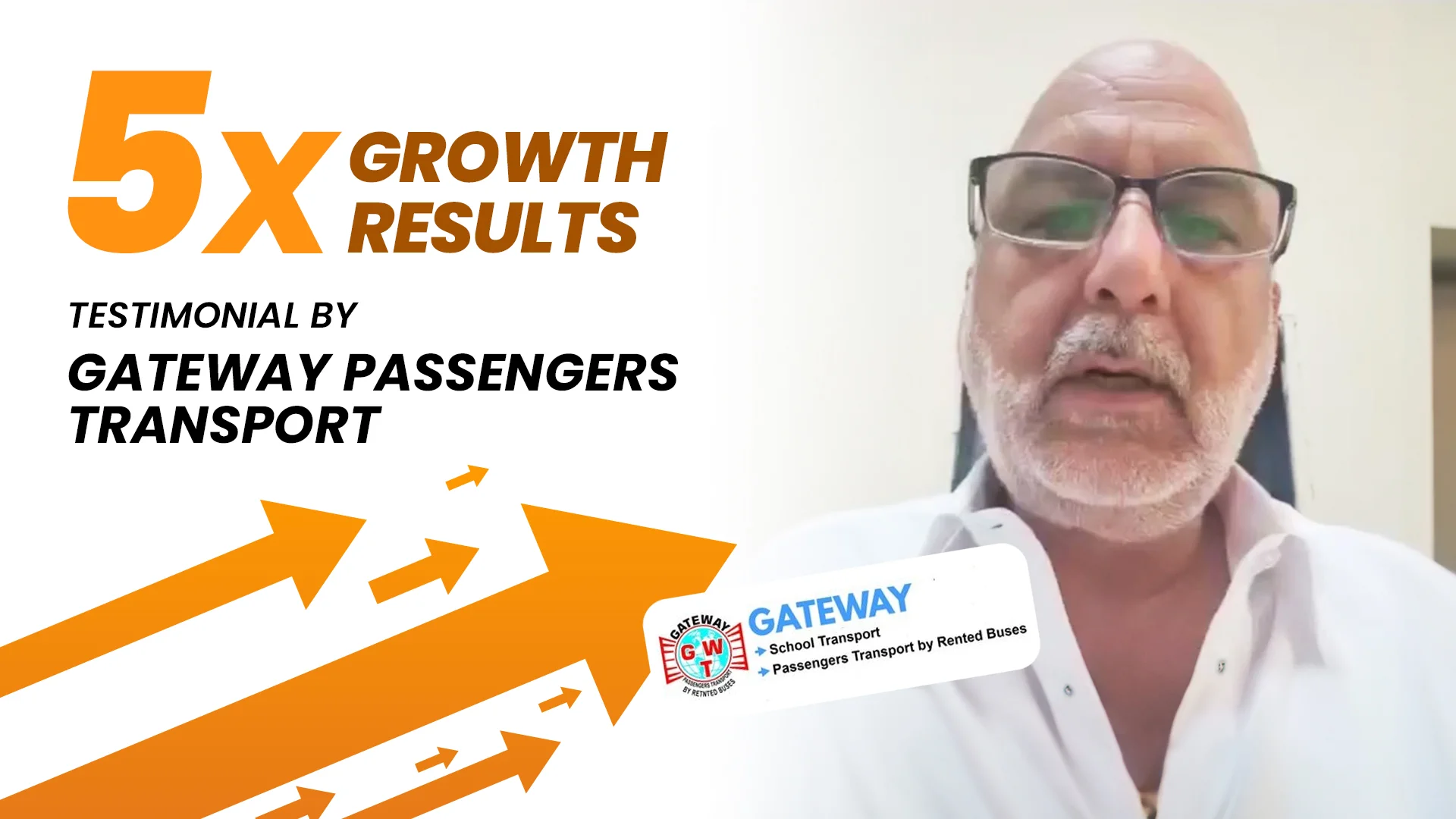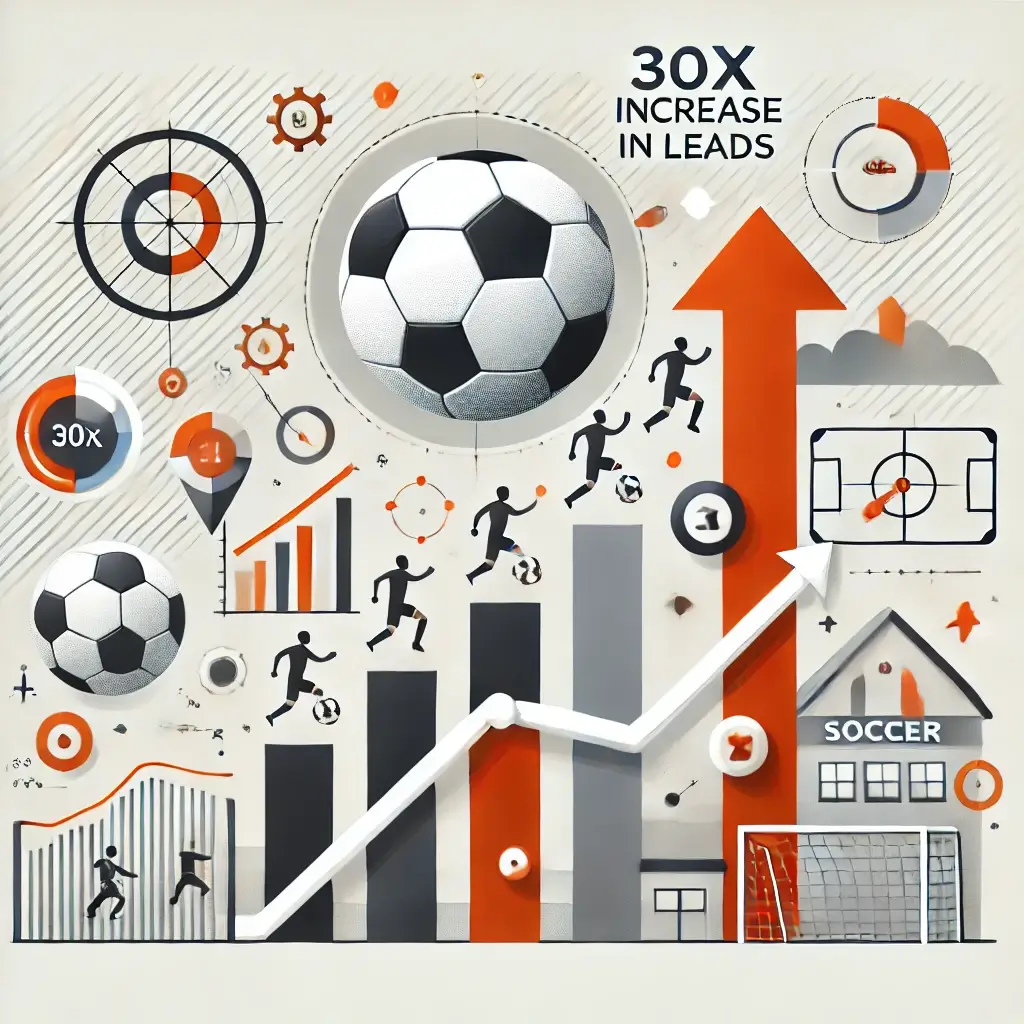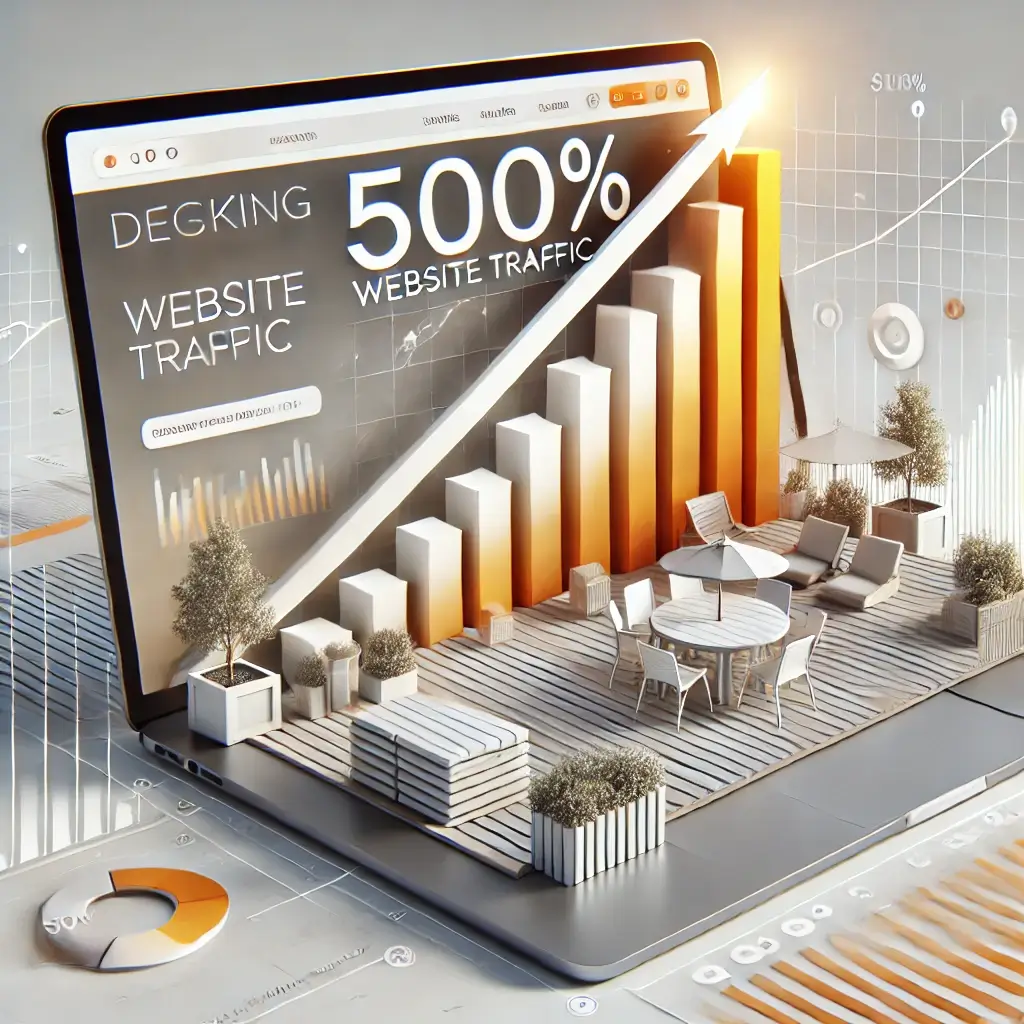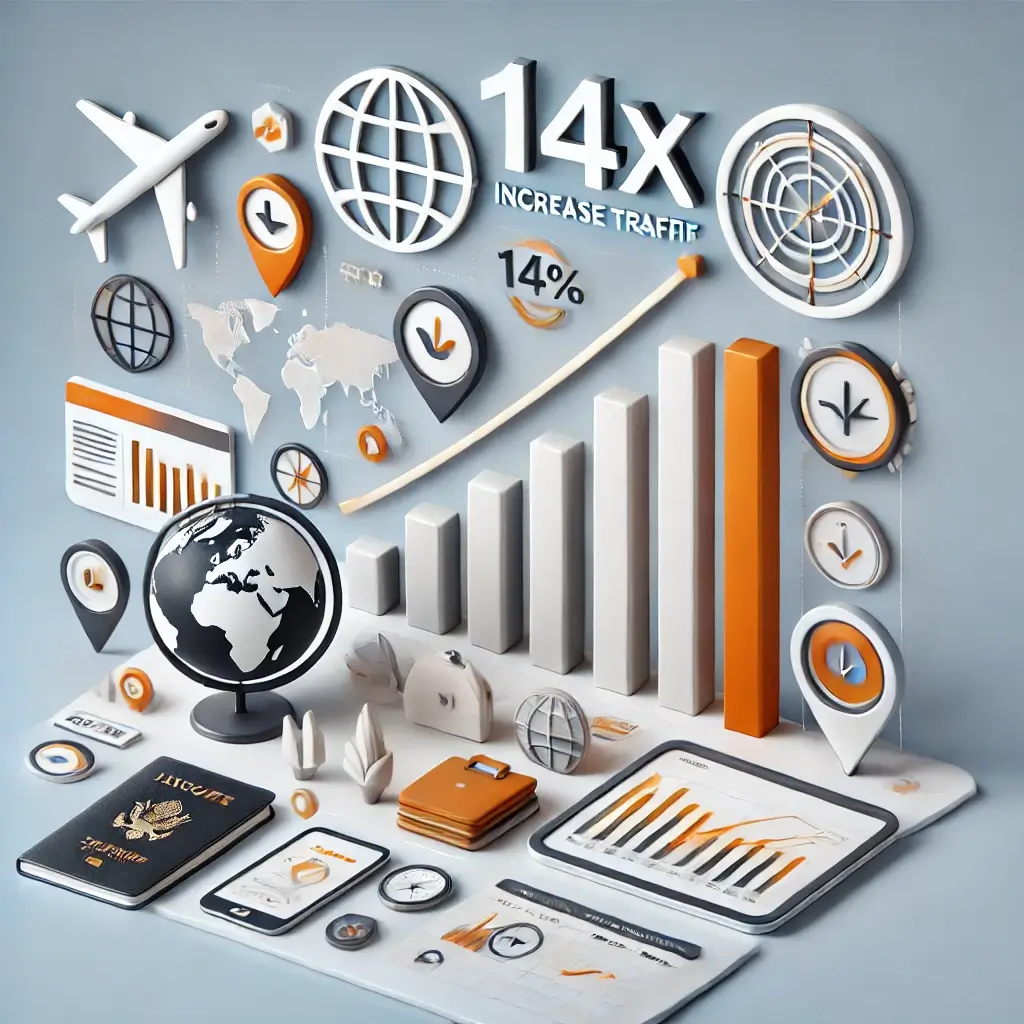
What's your thought?

Awesome! 5X begins here!
Please enter your details

"That’s disappointing, but understood."
Feel free to reach out when you're ready to grow.
Revolutionize Your Digital Presence
Transform Your Business with Cutting-edge Web & Digital Solutions
Elevate Your Brand's Impact - Get Started Today!
Trusted by 1,000+ Brands as their preferred Digital Marketing agency in Mumbai. Chosen for One Reason: Results.










Struggling to Stand Out in a Digital World?
Unleash Your Brand’s Potential with Our Strategic Solutions
In today’s competitive Middle East market, having a robust digital strategy is essential. Yet, many businesses struggle with outdated web designing, ineffective digital marketing solutions, and generic AI approaches that fail to deliver results. Without cutting-edge Web designing in Middle East and personalized digital marketing solutions, businesses lose out on potential customers and growth.
The complexity of modern digital landscapes requires expert AI navigation that aligns with your business goals while maximizing online impact. Without strategic web designing in the Middle East, companies often struggle with slow, non-responsive sites that deter visitors. Meanwhile, the absence of effective digital marketing solutions in the Middle East and AI experts means missing out on valuable leads and market authority.
Overcome Digital Challenges
Ineffective Website Performance
Enhance user experience and functionality.
Lack of Digital Strategy
Develop a roadmap tailored to your business.
Low Customer Engagement
Boost interactions with targeted campaigns.
Obscure Brand Visibility
Increase visibility with expert marketing.
Unlock Unmatched Business Growth
Experience Impact-Driven Results with SySpree’s Proven Approach
SySpree employs the CORE framework, a strategic methodology designed to elevate your online presence. Through Consult, Optimize, Reinforce, and Excel, we deliver bespoke solutions that drive measurable growth. By consulting with you, we define your digital needs. We then optimize your web and marketing strategies, reinforce your brand’s messaging, and ensure you excel in outperforming competitors to dominate the market.

Consult
Begin with expert advice tailored to your needs.

Optimize
Refine strategies for maximum efficiency.

Reinforce
Strengthen your brand identity consistently.

Excel
Achieve outstanding business results.

Consult
Understand your unique business needs.

Optimize
Enhance functionality with innovative solutions.

Reinforce
Maintain peak performance and security.

Excel
Achieve and surpass your business objectives.

Optimize
Precision in aligning and maximizing your systems.

Consult
Expert guidance tailored to your specific goals.

Reinforce
Ensuring stability and trust in every integration.

Excel
Achieving superior results and competitive advantages.
Testimonials
What Our Clients Achieved with Us





Our Capabilities
Empowering Your Business with Comprehensive Solutions
Web Design
As a top provider of Web Designing in the Middle East, SySpree delivers visually striking, high-performance websites built for conversions. Our expert team of web designers crafts responsive, brand-aligned experiences that drive trust, engagement, and measurable growth across all devices.
Digital Marketing
Maximize your reach with SySpree’s full-suite Digital Marketing Solutions in the Middle East. From SEO and paid ads to content and social media, we execute ROI-driven strategies that help businesses lead their category online. Amplify authority, boost traffic, and turn visitors into loyal customers.
AI Marketing
Leverage intelligent automation with SySpree’s AI Experts in the Middle East. Our AI-powered marketing tools learn, adapt, and personalize in real time—driving better engagement, predictive insights, and campaign success. Perfect for brands that demand data-backed performance.
IT Services
From infrastructure setup to custom integrations, our IT services empower businesses with reliable, scalable solutions. We complement Web Designing in the Middle East and digital transformation goals with secure, future-proof systems built to scale.
Outsourcing
Streamline execution with SySpree’s trusted outsourcing and digital marketing solutions in the Middle East. We handle design, development, and ongoing support—backed by our in-house AI capabilities—to deliver cost-effective, high-performance results across regions and industries.
Websites That Deliver Real Results
Success Stories That Inspire Confidence
From doubling conversions to reducing bounce rates, Syspree’s websites consistently deliver results. Check out our case studies for in-depth stories of businesses like yours achieving success.
Tailored Designs for Your Unique Needs
Solutions for Every Industry
Our Global Presence
Countries We are Present In

Fueling Growth Through Data Excellence
Proven Success in Numbers
OUR LEADERSHIP


Our leadership ensures Syspree delivers innovation and measurable results through expert website design and development strategies.
OUR TEAM























Our skilled team combines creativity with precision, building websites that deliver exceptional user experiences and business results
CASE STUDIES
Proven Results Across Industries
Explore how Syspree has helped businesses across industries achieve measurable growth with tailored digital marketing and web development strategies. From e-commerce to tech startups, our custom solutions deliver proven results that drive revenue, improve customer acquisition, and enhance brand visibility

CASE STUDIES
30 Times Surge in Leads within a year
Sports Coaching Company

CASE STUDIES
Astounding 800% Increase in FMCG Distributor’s Web Traffic in Just 13 Months!
FMCG Distributors

CASE STUDIES
500% Traffic boost in only 6 months
DECKING AND PATIO COMPANY

CASE STUDIES
Improve Your Traffic by 1400% In Just 2 months!
Immigration Company

CASE STUDIES
900% Traffic Surge in Just 1.5 Years
Holistic Lifestyle
e-commerce

CASE STUDIES
Double Leads for Accounting company in just 2 months
Accountants and corporate services
OUR EXPERTISE, YOUR KNOWLEDGE
Blogs, Podcasts,Vlogs

Future-Proof Your Business with AI in Digital Marketing
Let’s Make Your Vision a Reality
Transform Your Digital Landscape Today
FAQ
Your Web Development and Digital Marketing Questions Answered
Localized content plays an integral role in achieving digital marketing success in Arabic-speaking countries within the GCC. In a region where culture, language, and values deeply influence purchasing decisions, brands need to adopt a strategy that goes beyond simple translation. True localisation requires an in-depth understanding of the market’s cultural nuances, user behaviour, and language subtleties. This ensures that your messaging resonates with your target audience authentically, builds trust, and drives conversions.
For businesses aiming to dominate online in the GCC, relying solely on generic content is no longer effective. Incorporating Digital Marketing Solutions in Middle East with a strong focus on localisation amplifies brand relevance and positions your business as a preferred choice among competitors. For example, a website with Arabic content crafted by native copywriters combined with strategic Web Designing in Middle East ensures culturally appropriate layouts, imagery, and fonts that enhance user experience. Arabic is read right-to-left, and an effective design aligns with this while maintaining responsive and visually appealing layouts.
Moreover, localised digital content significantly improves SEO performance. Search engines like Google prioritise content that matches user intent and language preferences. Including Arabic keywords naturally throughout your website’s headings, meta tags, alt texts, and body content drives organic traffic efficiently. When these keywords are combined with professionally optimised Web Designing in Middle East, users stay longer, engage deeper, and convert faster due to easy navigation and culturally attuned design elements.
Another crucial factor is trust-building. Consumers in the GCC are relationship-driven and prefer engaging with brands that communicate in their native language and align with their cultural ethos. Tailored Digital Marketing Solutions in Middle East ensure your content uses idioms, tone, and references familiar to them, which directly improves brand credibility and loyalty.
Furthermore, integrating localisation within paid advertising campaigns enhances ROI. Ads crafted in Arabic with culturally relevant visuals have higher click-through rates and lower bounce rates. They perform better because they feel more personalised. This is where AI Experts in Middle East play a vital role, as they analyse regional user data to inform content personalisation strategies at scale. AI tools can identify trending cultural references, peak activity times, and preferred language styles, ensuring your digital marketing remains relevant and impactful.
For e-commerce brands, localisation extends to product descriptions, user interface, checkout processes, and customer support in Arabic. When combined with targeted Digital Marketing Solutions in Middle East, it nurtures customer confidence, reduces cart abandonment, and increases sales. Additionally, localising video content, social media posts, and email campaigns enhances omni-channel marketing performance.
In B2B sectors, offering Arabic whitepapers, case studies, and solution briefs demonstrates your commitment to serving regional clients effectively. Paired with Web Designing in Middle East that showcases these resources strategically within your website architecture, you provide seamless user journeys and professional credibility.
However, localisation is not just about Arabic language. Each GCC country – Saudi Arabia, UAE, Qatar, Kuwait, Bahrain, Oman – has distinct dialects, cultural references, and market expectations. Therefore, effective localisation involves market-specific research, keyword planning, and tailored messaging. For instance, promotions aligning with national holidays like UAE National Day or Saudi Founding Day significantly boost engagement and conversions.
Another dimension is compliance. Some GCC countries have strict content regulations and cultural sensitivities around imagery, gender representations, or religious references. Professional AI Experts in Middle East can support compliance monitoring by scanning content for regionally sensitive keywords or visuals, ensuring your brand stays compliant while remaining culturally impactful.
Localisation also improves your brand’s social listening ability. Monitoring regional social media conversations in Arabic enables your marketing team to adapt content strategies quickly. Integrating these insights into Digital Marketing Solutions in Middle East ensures campaigns remain dynamic and relevant, especially in fast-evolving GCC markets.
In summary, effective localisation:
Builds brand trust by speaking directly to your target audience in their native language.
Enhances SEO with Arabic keywords and culturally relevant content structures.
Improves website usability through culturally aligned Web Designing in Middle East.
Increases ROI of paid campaigns with higher engagement rates.
Supports compliance with regional content regulations.
Provides competitive differentiation against brands using generic, non-localised content.
Enables AI-powered personalisation and dynamic campaign adaptation.
At SySpree, we combine expert Web Designing in Middle East, result-driven Digital Marketing Solutions in Middle East, and insights from our top AI Experts in Middle East to create localised strategies that resonate, engage, and convert effectively. Our native Arabic content teams, regional SEO specialists, and AI strategists ensure your brand message remains culturally powerful while driving tangible business growth in the GCC.
Choosing the right digital marketing channels is critical for companies targeting Middle Eastern consumers, especially given the region’s unique cultural behaviours, high digital penetration, and diverse demographics. To achieve the best ROI, brands must adopt a multi-channel strategy integrated with Web Designing in Middle East, tailored Digital Marketing Solutions in Middle East, and the expertise of AI Experts in Middle East for data-driven decisions.
Social media remains the top-performing channel in the Middle East. Platforms like Instagram, Snapchat, TikTok, and Twitter have massive user bases, with Saudi Arabia leading Twitter usage globally and the UAE having some of the highest Instagram engagement rates. Visual storytelling, influencer marketing, and interactive reels or stories drive high ROI, as consumers here value brand relatability and aspirational content. For example, a fashion brand using Instagram influencers in Dubai or Riyadh achieves stronger brand trust and faster conversions than generic ads.
Paid social advertising also offers excellent returns when campaigns are localised with Arabic creatives and culturally relevant messaging. Digital Marketing Solutions in Middle East often include region-specific influencer partnerships, paid collaborations, and targeted video ads to amplify engagement. Furthermore, platforms like TikTok are rapidly growing among younger demographics, making short-form video content essential for brands targeting Gen Z and millennials.
Search Engine Marketing (SEM) and Search Engine Optimisation (SEO) remain critical channels for ROI. Many Middle Eastern consumers search in Arabic, so having a website built with Web Designing in Middle East best practices, local Arabic SEO, and region-focused landing pages ensures higher visibility. Paid search campaigns targeting Arabic keywords can deliver strong leads, especially in industries like real estate, automotive, education, and healthcare where users research extensively before conversion.
Email marketing, when executed strategically, also yields high ROI in the Middle East. Contrary to global trends, regional consumers engage with well-crafted, personalised email content. Integrating AI-powered segmentation by AI Experts in Middle East allows for customised newsletters, offers, and product recommendations, increasing open rates and conversions. For B2B sectors, email remains a primary channel for nurturing leads and driving proposal acceptance.
Programmatic advertising is another high-ROI channel, allowing brands to automate ad buying and reach hyper-targeted audiences across premium Arabic websites and apps. Combining programmatic with insights from AI Experts in Middle East ensures smarter bidding strategies, better placements, and higher conversion rates.
Additionally, YouTube advertising performs exceptionally well in the GCC. The region has some of the world’s highest YouTube consumption rates, particularly in Saudi Arabia and UAE. Video ads with Arabic voiceovers or subtitles significantly enhance engagement, build brand familiarity, and drive conversions. Integrating these campaigns with your Web Designing in Middle East ensures landing pages are mobile-responsive, fast-loading, and aligned with ad creatives for seamless user journeys.
WhatsApp marketing is also emerging as a strong ROI channel in the Middle East, where WhatsApp usage is ubiquitous. For industries like automotive, real estate, and e-commerce, enabling WhatsApp for Business for instant enquiries or catalogue sharing speeds up the sales funnel. It humanises brand communication and builds direct customer relationships.
Content marketing, particularly Arabic blogs, case studies, and whitepapers, enhances SEO while positioning brands as thought leaders. When these are integrated within a robust Digital Marketing Solutions in Middle East plan, they attract organic traffic, nurture trust, and support lead generation. Educational content performs well in sectors such as finance, health, and technology.
Furthermore, AI-powered retargeting remains a game-changer for ROI. Consumers in the Middle East often take longer to convert, comparing options before purchasing. Using AI Experts in Middle East to deploy dynamic retargeting ads across social media and Google Display Network ensures your brand stays top-of-mind, increasing conversion likelihood.
Finally, integrated omni-channel marketing, where all channels work cohesively with consistent messaging, enhances ROI substantially. For example, a campaign starting with influencer marketing, supported by Google Ads, reinforced via retargeting, and nurtured through email flows delivers better results than isolated campaigns.
To summarise, the digital marketing channels delivering the best ROI for Middle Eastern markets include:
Social media marketing (Instagram, TikTok, Snapchat, Twitter).
Paid social advertising with Arabic localisation.
Search Engine Marketing (Google Ads) targeting Arabic and English keywords.
SEO integrated with culturally attuned Web Designing in Middle East.
YouTube advertising with localised content.
WhatsApp for Business for direct lead capture and customer support.
Programmatic advertising for precise audience targeting.
Email marketing with AI-driven personalisation.
Content marketing with Arabic blogs, articles, and thought leadership.
AI-powered retargeting to reduce abandoned carts and incomplete enquiries.
At SySpree, we integrate these channels with our expertise in Web Designing in Middle East, powerful Digital Marketing Solutions in Middle East, and advanced analytics by AI Experts in Middle East to deliver measurable results, optimise ad spend, and accelerate brand growth for our clients.
Creating a high-performing web development and digital marketing roadmap for the Middle East requires a strategic blend of design excellence, cultural understanding, and targeted marketing. The region’s digital landscape is rapidly evolving, with consumers expecting seamless online experiences, personalised content, and culturally relevant engagement. To meet these expectations, brands must integrate Web Designing in Middle East, customised Digital Marketing Solutions in Middle East, and insights from AI Experts in Middle East into their roadmap.
The first step is market research and audience analysis. Understanding the cultural preferences, language nuances, purchasing behaviours, and digital habits of your target countries – whether UAE, Saudi Arabia, Qatar, Oman, Kuwait, or Bahrain – is essential. Each country, while united by Arabic language, has unique local dialects, social norms, and consumer expectations. This research informs all aspects of web design and marketing, ensuring relevance and resonance.
Next is website strategy and design planning. Your website is your brand’s digital home, and investing in professional Web Designing in Middle East ensures it is responsive, visually impactful, and culturally aligned. Arabic websites require right-to-left layouts, appropriate fonts, and culturally sensitive imagery. For example, using images that reflect local attire, architecture, or lifestyle builds immediate familiarity. Design should also prioritise mobile-first experiences, as mobile penetration in the Middle East exceeds 90%, with consumers often researching and purchasing directly from their phones.
Your roadmap should include technical SEO integration from the development stage. This involves clean URL structures, Arabic keyword research, optimised metadata in both Arabic and English, and structured data markup for enhanced search visibility. Effective SEO ensures your site ranks prominently on Google’s regional search engines, driving organic traffic and reducing long-term acquisition costs.
Another critical element is content localisation and creation. Translating content is not enough; it must be localised to incorporate cultural idioms, tone, and context. For instance, product descriptions, service pages, blogs, and CTAs should speak naturally to Arabic audiences. Incorporating local references, festivals, and values within your content strategy enhances engagement and trust. Combining this with Digital Marketing Solutions in Middle East amplifies your brand relevance and builds strong customer relationships.
Your roadmap must also outline performance-driven digital marketing strategies. This includes:
Social media marketing tailored for platforms like Instagram, TikTok, Snapchat, and Twitter, popular across the GCC. Content should be visual, interactive, and aligned with regional trends.
Paid advertising campaigns leveraging Google Ads and paid social with Arabic creatives to maximise reach and conversions.
Influencer marketing partnerships with regional influencers who resonate with your target demographics, enhancing authenticity and brand trust.
Content marketing, including Arabic blogs, articles, videos, and whitepapers, to position your brand as a thought leader while boosting SEO.
Integrating AI-driven personalisation and automation is another pillar. AI Experts in Middle East can help implement tools that analyse user behaviour, segment audiences, and personalise content, offers, and recommendations. This results in improved user experiences, higher engagement, and increased conversion rates. AI chatbots in Arabic, for instance, improve customer support responsiveness, while AI analytics optimise campaign performance in real-time.
The roadmap must also cover conversion rate optimisation (CRO) strategies. Every landing page should have clear CTAs, mobile-friendly forms, Arabic-enabled chat support, and strategically placed trust signals such as local certifications or payment logos. Testing different layouts, headlines, and visuals using A/B testing tools ensures continuous improvement and maximum lead generation.
Furthermore, integrating omnichannel strategies is crucial for the Middle East market, where consumers interact with brands across multiple touchpoints before purchasing. Ensuring your website design, social media profiles, email campaigns, and paid ads maintain consistent branding, tone, and messaging creates seamless user journeys and increases trust.
Compliance and security planning are also essential. Regional data protection regulations vary by country, and businesses must ensure websites adhere to local laws while maintaining robust cybersecurity measures to protect user data and build customer confidence.
Another important inclusion is analytics and performance tracking. Setting up Google Analytics, Search Console, and social media analytics dashboards with region-specific goals and KPIs enables continuous monitoring and optimisation. AI Experts in Middle East can further enhance this by implementing AI analytics tools that predict user behaviours, identify trends, and provide actionable insights for growth.
Finally, a strong roadmap includes scalability and future readiness planning. As the Middle East continues to adopt advanced technologies like AR, VR, and AI-powered commerce experiences, your web development and digital marketing strategies should be flexible to integrate these innovations. This ensures your brand stays ahead of competitors and appeals to tech-savvy consumers in the region.
In summary, a high-performing Middle East-focused web development and digital marketing roadmap must include:
Market research and cultural insights.
Responsive and culturally aligned Web Designing in Middle East.
Arabic-focused SEO integration from the development stage.
Localised content creation for relevance and engagement.
Performance-driven Digital Marketing Solutions in Middle East across all key channels.
AI-powered personalisation and automation by AI Experts in Middle East.
Conversion rate optimisation strategies for lead and sales growth.
Omnichannel marketing integration for seamless brand experiences.
Compliance with regional data laws and robust cybersecurity.
Analytics tracking, AI insights, and future scalability planning.
At SySpree, we integrate these elements seamlessly to build roadmaps that deliver measurable results, enhance brand reputation, and drive sustainable growth for your business across the Middle East.
Web development plays a critical role for businesses aiming to scale digitally in the Middle East. In a region witnessing rapid digital transformation, where consumers increasingly interact, research, and purchase online, having a professionally developed website is no longer optional – it is a business necessity. Effective Web Designing in Middle East acts as the foundation of your brand’s digital presence, directly influencing user trust, engagement, and conversions.
Firstly, a well-developed website establishes credibility. In markets like UAE and Saudi Arabia, where digital literacy is high, consumers often assess a company’s professionalism based on its website quality. Outdated designs, broken links, and slow-loading pages negatively impact user perception, leading to lost business opportunities. Investing in modern, responsive Web Designing in Middle East ensures your website looks visually appealing while functioning seamlessly across all devices, including smartphones, which are the primary browsing tool in the region.
Secondly, web development aligned with regional user behaviour enhances customer experience. Arabic-speaking users read right-to-left, so your design must accommodate this for smooth navigation. Culturally appropriate imagery, fonts, and layouts build relatability and trust, ensuring visitors engage deeply with your content and brand. For example, an e-commerce brand with an Arabic-first user interface and locally familiar payment gateways gains customer preference over generic global sites.
Additionally, effective web development improves SEO performance significantly. Websites built with clean code, optimised page structures, and Arabic keywords integrated into URLs, meta descriptions, and content rank higher on regional search engines. Combined with Digital Marketing Solutions in Middle East, this increases organic traffic, reduces paid acquisition costs, and drives sustainable growth. Many brands overlook technical SEO during development, resulting in sites that look good but fail to attract or convert visitors efficiently.
Web development also enables the integration of AI-powered tools that personalise user experiences. AI Experts in Middle East help embed AI chatbots to provide instant Arabic customer support, AI recommendation engines to suggest relevant products or content, and AI analytics to understand user journeys. This creates a dynamic website that adapts to user needs, driving higher engagement and sales conversions.
Moreover, scalability is a key advantage of professional web development. As your business grows, your website must handle increased traffic, new product categories, advanced functionalities like multilingual options, and integration with CRM, ERP, or third-party apps. A scalable website built with robust frameworks and future-ready architecture ensures you can expand offerings without downtime or performance issues, crucial for businesses targeting multiple GCC markets.
Security is another critical aspect. With rising cyber threats, Middle East consumers are cautious about where they share data. A professionally developed website ensures SSL certification, secure payment gateways, and compliance with regional data protection laws, building customer confidence. For industries like healthcare, finance, and e-commerce, this is non-negotiable.
Additionally, web development that integrates seamlessly with your digital marketing enhances campaign performance. For instance, landing pages designed with persuasive layouts, mobile responsiveness, and fast-loading speeds improve Quality Scores in Google Ads, reducing cost-per-click and increasing conversion rates. Similarly, social media ads linking to optimised, well-designed landing pages deliver better ROI due to consistency in user experience.
Another important factor is analytics integration. Professional Web Designing in Middle East includes embedding Google Analytics, Search Console, and advanced AI-powered analytics tools for continuous performance tracking. These insights inform data-driven decisions for your marketing, content, and user experience strategies, ensuring your brand remains competitive in fast-evolving regional markets.
For B2B businesses, a strong website acts as a credibility and lead-generation platform. Including case studies, regional project portfolios, Arabic whitepapers, and easy enquiry forms positions your brand as a trusted partner for local businesses, government contracts, and large-scale projects.
Furthermore, your website serves as the central hub for all your Digital Marketing Solutions in Middle East. Whether you are driving traffic from social media, paid ads, email campaigns, or influencer partnerships, every initiative ultimately leads users to your website. Therefore, its performance, design, and functionality directly determine the success of your digital strategy.
In summary, the importance of web development for businesses looking to scale digitally in the Middle East includes:
Establishing credibility and professional brand perception.
Enhancing user experience with culturally aligned, responsive designs.
Improving SEO performance with technically optimised development.
Enabling AI-powered personalisation and advanced functionalities.
Ensuring scalability for business growth across GCC markets.
Providing robust security and compliance with data protection laws.
Maximising ROI from digital marketing campaigns with optimised landing pages.
Facilitating continuous analytics tracking for data-driven improvements.
Positioning B2B brands as credible and resource-rich market leaders.
Acting as the conversion hub for all integrated marketing initiatives.
At SySpree, our expert team combines advanced Web Designing in Middle East, customised Digital Marketing Solutions in Middle East, and AI integration strategies to develop websites that not only look exceptional but also perform as powerful business growth tools. We ensure your brand is equipped with a future-ready website that drives traffic, builds trust, and scales efficiently in the region’s competitive digital landscape.
As we move into 2025, web design trends in the Middle East continue to evolve rapidly, driven by consumer expectations for immersive digital experiences, cultural alignment, and seamless usability. Businesses that leverage these trends through professional Web Designing in Middle East, integrated Digital Marketing Solutions in Middle East, and insights from AI Experts in Middle East can achieve superior user experiences and higher conversion rates.
One of the leading trends is Arabic-first design with RTL optimisation. Websites targeting the Middle East must prioritise right-to-left (RTL) layouts that cater to Arabic readers. This includes navigation menus, typography, content placement, and call-to-action buttons aligned to natural reading flow. Brands that localise designs beyond simple translation and incorporate cultural motifs, colours, and imagery relatable to regional audiences build instant trust and emotional connection.
Dark mode design is gaining popularity across GCC markets due to its visual sophistication and improved readability in low-light settings. Brands adopting dark mode options enhance user comfort and engagement, especially among younger consumers who spend extended time browsing at night.
Another major trend is AI-powered personalisation. With rising competition, generic websites fail to retain user attention. Integrating AI tools recommended by AI Experts in Middle East enables dynamic personalisation – displaying tailored product recommendations, content blocks, and offers based on user behaviour, purchase history, and preferences. This enhances UX by making the browsing experience feel curated, while driving conversions through targeted CTAs.
Minimalist and ultra-fast designs are in demand, focusing on simplicity, whitespace, and intuitive navigation. Users value clean layouts that load instantly and guide them effortlessly towards actions. Speed is a crucial ranking factor in Google’s algorithm, and minimalist designs reduce clutter, improve mobile performance, and enhance overall SEO.
Micro-interactions and animations are also trending. Subtle animations on buttons, icons, or transitions add a sense of responsiveness and delight, creating engaging UX without distracting from the core content. For example, hover effects on CTAs or animated progress bars improve user engagement and encourage deeper exploration.
Another emerging trend is voice search optimisation. With the growing use of voice assistants in Arabic, websites incorporating voice search capabilities or optimising for conversational keywords gain a competitive edge. This is particularly effective for e-commerce, hospitality, and service industries where users seek quick, spoken queries.
Inclusive design with accessibility integration is becoming essential. Brands are adopting WCAG standards, ensuring websites are usable for people with disabilities by including readable fonts, alternative text for images, and easy keyboard navigation. Inclusive design enhances UX for all users and builds brand reputation as socially responsible and user-focused.
In 2025, immersive storytelling through interactive design elements will dominate. Websites that combine visuals, video backgrounds, parallax scrolling, and interactive infographics create memorable experiences. For example, real estate or tourism brands can showcase properties or destinations using interactive virtual tours, enhancing both user experience and conversion rates by building confidence before inquiry or purchase.
Mobile-first progressive web apps (PWAs) remain a top trend. With mobile penetration exceeding 90% in the Middle East, PWAs combine the functionality of apps with website accessibility, offering offline usability, push notifications, and lightning-fast load times. Brands investing in PWAs as part of their Web Designing in Middle East strategy provide superior UX while boosting engagement and repeat visits.
Cultural customisation and localisation design trends continue to strengthen. From incorporating regional calligraphy styles to using local imagery and colour psychology aligned with cultural symbolism (e.g., green for trust and prosperity in Saudi Arabia), brands that deeply localise designs outperform generic templates.
Additionally, AI-driven chatbots with Arabic NLP are becoming standard for websites aiming to scale customer service and lead acquisition. AI chatbots designed by AI Experts in Middle East handle inquiries instantly in Arabic, improving user satisfaction and speeding up conversion processes for e-commerce, healthcare, and financial services.
Finally, integration of social commerce elements within websites is on the rise. Features like embedded Instagram shops, WhatsApp ordering, and social sharing buttons within product pages improve conversion rates by bridging website experiences with social media commerce trends prevalent in the Middle East.
To summarise, the top web design trends in the Middle East for 2025 that enhance UX and conversions include:
Arabic-first RTL optimised layouts for cultural alignment.
Dark mode designs enhancing visual sophistication and comfort.
AI-powered personalisation for tailored user experiences.
Minimalist designs focusing on speed, clarity, and SEO performance.
Micro-interactions and animations for engaging, dynamic UX.
Voice search optimisation to cater to Arabic voice queries.
Inclusive design ensuring accessibility for all users.
Immersive storytelling with interactive visuals and videos.
Mobile-first PWAs for app-like experiences with web accessibility.
AI chatbots with Arabic NLP for superior customer support and conversions.
At SySpree, we integrate these trends through expert Web Designing in Middle East, innovative Digital Marketing Solutions in Middle East, and advanced AI integration. This ensures our clients not only keep pace with evolving consumer expectations but lead their industries with websites that attract, engage, and convert effectively in the Middle Eastern digital landscape.
The adoption of AI marketing tools in the Middle East is growing rapidly as businesses seek to enhance efficiency, personalise customer experiences, and drive better ROI from their digital campaigns. Leading brands now integrate AI tools alongside Web Designing in Middle East and targeted Digital Marketing Solutions in Middle East to deliver data-driven, impactful campaigns. The role of AI Experts in Middle East has become vital in selecting, implementing, and optimising these tools to suit local markets.
One of the most widely adopted tools is AI-powered customer segmentation platforms like HubSpot and Salesforce Marketing Cloud’s Einstein AI. These tools analyse user behaviour, demographics, and purchase history to segment audiences into micro-groups for hyper-personalised targeting. This ensures each segment receives relevant ads, emails, and offers, increasing engagement and conversion rates. For instance, an e-commerce brand targeting Saudi Arabia can segment users based on city, language preference (Gulf Arabic or Modern Standard Arabic), and purchase patterns to craft tailored campaigns.
Chatbots with Arabic NLP capabilities such as IBM Watson Assistant and ManyChat are another effective AI marketing tool in the region. Brands integrate these bots on their websites and social media to provide instant customer support, capture leads, and resolve FAQs in Arabic, enhancing user satisfaction and operational efficiency. This aligns well with professional Web Designing in Middle East, where chatbots are seamlessly embedded into site layouts for quick user assistance.
AI-based content generation tools like Jasper and Copy.ai are gaining traction, helping marketers draft Arabic and English ad copies, social media posts, and blogs efficiently. However, the best results emerge when these are refined by human copywriters to ensure cultural alignment, as direct AI-generated Arabic may miss local idioms or context. AI Experts in Middle East assist by training these tools with region-specific datasets for higher relevance.
Another key AI tool is predictive analytics software such as Google Analytics 4 with AI insights and Adobe Sensei. These tools analyse website and campaign data to predict user behaviour, identify conversion opportunities, and suggest improvements in real-time. For example, AI may identify that visitors from UAE engage more with certain product categories on mobile and suggest design or offer adjustments to drive sales.
Dynamic retargeting platforms like AdRoll and Criteo are widely used to re-engage website visitors with personalised ads across social media and websites. AI analyses products viewed, time spent, and user preferences to serve highly relevant display ads, improving click-through and conversion rates. This approach is especially effective in sectors like travel, automotive, and e-commerce, where purchase decisions involve multiple touchpoints.
AI visual recognition tools such as Google Vision and Clarifai are emerging in digital marketing campaigns. Brands use them to tag and organise large visual content libraries efficiently and to enable visual search functionalities on websites, enhancing user experience. For example, a fashion brand can integrate visual search allowing customers to upload an image and find similar products instantly, aligning with advanced Web Designing in Middle East for seamless integration.
In influencer marketing, tools like Heepsy and HypeAuditor leverage AI to identify genuine influencers, analyse audience authenticity, and predict engagement rates, ensuring brands invest in collaborations that drive real results. Middle Eastern markets are heavily influencer-driven, making AI essential for campaign ROI.
AI-powered email marketing platforms such as Mailchimp’s Smart Recommendations and ActiveCampaign use machine learning to personalise email content, subject lines, and send times for each subscriber. This has led to significant increases in open and conversion rates for brands running regional campaigns targeting segmented Arabic-speaking audiences.
Another effective tool is Conversational AI for WhatsApp Business API, used by banks, e-commerce brands, and real estate companies. AI-driven WhatsApp bots handle queries, provide catalogues, book appointments, and even process transactions in Arabic, ensuring instant and convenient customer interactions.
AI-based social listening tools like Brandwatch and Sprinklr are critical for monitoring regional conversations, brand mentions, and sentiment in Arabic and English. These insights inform digital marketing strategies, influencer campaigns, and content direction, ensuring brands remain relevant to evolving consumer expectations.
Finally, AI ad optimisation tools such as Revealbot and Pattern89 analyse thousands of ad creative variables to identify top-performing designs, headlines, and placements. This enhances ROI by automating and accelerating A/B testing, freeing marketing teams to focus on strategic planning and localisation.
In summary, the most effective AI marketing tools being used in digital campaigns across the Middle East include:
AI-powered customer segmentation platforms for hyper-personalised targeting.
Arabic NLP chatbots for instant customer support and lead capture.
AI content generation tools for efficient copywriting and idea generation.
Predictive analytics tools to inform data-driven marketing decisions.
Dynamic retargeting platforms for personalised re-engagement ads.
AI visual recognition for advanced website search functionalities.
Influencer marketing AI tools for authentic collaboration identification.
AI email marketing platforms for personalised content and timing.
Conversational AI for WhatsApp to automate customer interactions in Arabic.
AI social listening tools for real-time market and sentiment insights.
AI ad optimisation tools for creative testing and budget efficiency.
At SySpree, we integrate these tools through expert AI Experts in Middle East, advanced Web Designing in Middle East, and tailored Digital Marketing Solutions in Middle East. This ensures our clients stay ahead in a competitive landscape, maximise campaign ROI, and deliver experiences that engage, convert, and retain customers effectively.
AI experts in the Middle East play a crucial role in enabling regional businesses to achieve growth, efficiency, and long-term competitive advantage. As digital transformation accelerates across GCC economies, companies that leverage AI strategically – combined with effective Web Designing in Middle East and targeted Digital Marketing Solutions in Middle East – unlock new revenue streams, optimise operations, and deliver superior customer experiences.
Firstly, AI experts in Middle East bring deep knowledge of regional market dynamics and cultural nuances, ensuring AI tools are implemented effectively for local audiences. For instance, deploying AI chatbots with Arabic NLP capabilities significantly improves customer support efficiency. These chatbots handle FAQs, resolve issues instantly, and operate 24/7, enhancing customer satisfaction while reducing operational costs.
Secondly, AI experts drive growth through data analytics and predictive insights. Most businesses collect large volumes of data but lack the expertise to interpret and act on it. AI experts use advanced analytics to identify user behaviour patterns, predict purchasing trends, and segment customers based on engagement likelihood. For example, in retail, AI can analyse purchase histories to forecast demand and inform inventory management, reducing stockouts and excesses while improving cash flow.
Thirdly, AI experts integrate personalisation strategies into digital marketing, enhancing conversion rates and ROI. Personalisation has become an expectation rather than a luxury in the Middle East’s digital landscape. By implementing AI-powered recommendation engines on e-commerce sites, brands can display products based on browsing history, demographic data, and preferences, increasing average order value. Combining these strategies with professional Web Designing in Middle East ensures the personalised elements are seamlessly embedded within website structures for maximum impact.
Additionally, AI experts enhance digital advertising performance. Using AI tools to analyse campaign data in real-time, they optimise targeting, adjust bids dynamically, and identify top-performing creatives to maximise ROI. For example, AI can analyse engagement data across Facebook, Instagram, TikTok, and Google Ads, reallocating budgets towards platforms and creatives delivering the highest returns.
In content marketing, AI experts support brands by leveraging AI tools for content ideation and optimisation. They use AI-driven keyword research to identify topics with high search potential and deploy AI writing assistants to draft outlines and first drafts efficiently. However, they also ensure cultural and linguistic relevance, refining AI outputs for Arabic content to resonate authentically with regional audiences.
AI experts also drive competitive advantage by enhancing customer experiences with predictive personalisation. For instance, in banking, AI analyses user spending patterns to recommend personalised financial products. In healthcare, AI predicts appointment no-shows, enabling hospitals to optimise scheduling and reduce operational inefficiencies.
Another critical area where AI experts provide value is process automation. Businesses often waste significant time on repetitive tasks like data entry, invoice processing, or lead scoring. AI experts implement Robotic Process Automation (RPA) solutions to automate such tasks, freeing teams to focus on strategic growth activities. This enhances operational efficiency and reduces costs, giving businesses an advantage in highly competitive sectors.
AI experts also facilitate fraud detection and security enhancement. In sectors like banking, insurance, and e-commerce, AI algorithms monitor transactions in real-time, identify anomalies, and flag suspicious activities instantly. This reduces financial risks and builds customer trust, which is vital in the Middle East where digital security concerns are prominent.
Furthermore, AI experts support dynamic pricing strategies for businesses in retail, travel, and hospitality. By analysing market demand, competitor pricing, and inventory levels, AI recommends optimal pricing to maximise sales and profit margins. For example, airlines use AI to adjust ticket prices dynamically based on demand patterns, day of the week, and historical trends.
AI experts also enable businesses to adopt visual recognition technologies. Retailers can deploy AI visual search on websites, allowing customers to upload product images and instantly find similar items, enhancing UX and boosting conversions. This requires advanced implementation aligned with professional Web Designing in Middle East to ensure seamless functionality.
In addition, AI experts enhance social listening capabilities. Using AI-powered tools, they monitor brand mentions, track sentiment in Arabic and English, and identify emerging trends or customer concerns. These insights inform proactive brand strategies, campaign messaging, and crisis management, giving businesses an edge over competitors reacting late to market shifts.
AI experts also facilitate voice search optimisation. With the rising use of voice assistants in Arabic, businesses that integrate AI to optimise content for conversational queries gain higher visibility and customer accessibility.
Moreover, AI experts drive innovation by supporting new product and service development. For instance, in real estate, AI tools analyse market data to identify high-demand property types and locations, informing developers’ investment decisions. In education, AI personalises learning experiences, tailoring lesson plans to student progress and learning styles.
To summarise, AI experts in the Middle East drive growth and competitive advantage through:
Deploying AI chatbots with Arabic NLP for instant customer support.
Leveraging predictive analytics to inform data-driven decisions.
Enhancing digital marketing personalisation for higher conversions.
Optimising advertising performance with AI-driven adjustments.
Automating repetitive processes to improve operational efficiency.
Implementing AI-powered fraud detection for secure transactions.
Developing dynamic pricing strategies to maximise profits.
Integrating AI visual recognition for advanced website functionalities.
Strengthening social listening to inform proactive brand strategies.
Optimising for voice search to increase accessibility and visibility.
Supporting new product development with AI market insights.
At SySpree, our AI Experts in Middle East work alongside web development and digital marketing teams to integrate these AI solutions seamlessly. Combined with our expertise in Web Designing in Middle East and comprehensive Digital Marketing Solutions in Middle East, we empower regional businesses to innovate, grow, and lead confidently in an increasingly AI-driven economy.
Integrating AI with digital marketing campaigns has become a transformative strategy for businesses in the Middle East seeking to maximise customer engagement, build loyalty, and achieve sustainable growth. With rising digital adoption across the GCC, brands that combine AI capabilities with expert Web Designing in Middle East and tailored Digital Marketing Solutions in Middle East stand out in a crowded marketplace by offering experiences that feel personal, responsive, and relevant.
Firstly, AI enhances audience targeting and segmentation. Traditional segmentation divides audiences based on broad demographics, but AI uses advanced algorithms to analyse behavioural patterns, browsing history, purchase behaviour, and social media activity. This enables brands to create micro-segments and serve hyper-personalised ads or content that directly address individual needs and preferences. For example, a fashion retailer targeting Saudi women can use AI to identify specific styles, colours, and brands preferred by different age groups or cities, crafting tailored ad creatives that resonate and drive higher engagement.
Secondly, AI integration improves content personalisation, which is vital in the Middle East, where consumers expect brands to understand their cultural values, language preferences, and aspirations. AI-powered recommendation engines display products, blogs, or videos based on user behaviour and past interactions. For e-commerce, this increases average order value and repeat purchases, while for media websites, it boosts time spent on site and loyalty. Combining AI personalisation with professional Web Designing in Middle East ensures these recommendations are displayed prominently within clean, responsive, and culturally attuned layouts, enhancing overall UX.
Another impactful benefit is AI-powered chatbots with Arabic NLP capabilities. These bots provide instant, 24/7 customer support, resolving FAQs, capturing leads, and assisting in purchases without human intervention. In a region where customer service expectations are high, AI chatbots improve engagement by offering quick solutions in the user’s native language, increasing satisfaction and reducing bounce rates.
AI also enhances predictive analytics and customer journey optimisation. By analysing user behaviour data, AI predicts what content, offers, or products a customer is most likely to engage with next. This allows brands to craft marketing campaigns that guide users seamlessly through the funnel, increasing conversion likelihood. For instance, a travel brand can use AI to identify users searching for flight tickets to Dubai and retarget them with personalised hotel packages and curated city experiences, improving relevance and engagement.
Dynamic email marketing automation is another area where AI integration elevates customer engagement. AI tools personalise subject lines, recommend optimal send times for each subscriber, and suggest content tailored to user interests. This leads to higher open rates, click-through rates, and conversions. For Middle Eastern markets, where consumers value direct and personalised communication, AI-powered emails create a sense of exclusivity and brand care.
Moreover, AI improves ad performance optimisation. AI tools analyse thousands of ad creative variations, targeting options, and bidding strategies to identify combinations that deliver the highest engagement and ROI. This real-time optimisation ensures campaigns remain relevant and cost-efficient while maintaining high engagement rates.
AI integration also enables visual and voice search functionalities. Visual search tools allow users to upload images and find similar products instantly, enhancing UX for fashion, furniture, and lifestyle brands. Meanwhile, voice search optimisation ensures your website and content are discoverable by users conducting Arabic voice queries through Siri, Alexa, or Google Assistant. This aligns with consumer behaviour trends in the Middle East, where voice assistant usage is growing rapidly.
Furthermore, AI enhances social media engagement through content optimisation. AI tools analyse which types of posts perform best – whether reels, carousels, or stories – and suggest optimal posting times based on follower activity patterns. This ensures social media campaigns remain engaging, timely, and algorithm-friendly, driving higher organic reach and interaction.
Another key area is AI-driven sentiment analysis and social listening. AI tools monitor brand mentions across platforms in Arabic and English, analyse sentiment, and identify emerging conversations or crises. This enables brands to engage proactively, address concerns quickly, and participate in trending discussions, building positive brand perception and deeper customer trust.
Additionally, AI supports A/B testing automation for landing pages and ads. Instead of manual testing over weeks, AI rapidly tests variations and deploys top-performing designs in real-time. Combined with expert Web Designing in Middle East, this ensures your website continuously evolves to offer the best user experience and conversion pathways for regional audiences.
Finally, AI integration enables omnichannel personalisation. Customers today interact with brands across multiple touchpoints – social media, websites, WhatsApp, email, and offline. AI unifies data from these touchpoints to create cohesive user profiles and ensures consistent messaging and experiences across all channels. This enhances customer engagement by making every interaction feel connected, seamless, and personalised.
To summarise, integrating AI with digital marketing campaigns improves customer engagement in the Middle East by:
Delivering hyper-personalised targeting and micro-segmentation.
Enhancing content personalisation for higher relevance and impact.
Providing instant Arabic customer support via AI-powered chatbots.
Optimising customer journeys with predictive analytics.
Personalising email marketing for higher open and click rates.
Improving ad performance with AI-driven optimisation.
Enabling visual and voice search for enhanced accessibility.
Boosting social media engagement with AI content recommendations.
Enhancing brand reputation with sentiment analysis and proactive social listening.
Automating A/B testing to continuously improve user experience.
Creating seamless omnichannel personalisation for connected brand experiences.
At SySpree, our AI Experts in Middle East integrate these solutions within our Web Designing in Middle East projects and comprehensive Digital Marketing Solutions in Middle East to ensure brands not only engage customers but build lasting relationships and achieve measurable business growth in an increasingly AI-driven regional market.
Adapting digital marketing solutions to respect cultural and religious values is essential for brands aiming to succeed in the Middle East. This diverse region has deeply rooted traditions, Islamic values, and social norms that influence consumer behaviour and brand perception. Companies that integrate cultural sensitivity with professional Web Designing in Middle East, strategic Digital Marketing Solutions in Middle East, and guidance from AI Experts in Middle East build trust, avoid reputational risks, and connect authentically with their audiences.
Firstly, understanding and respecting Islamic values is crucial. Content and campaigns must avoid imagery, language, or messaging that contradicts religious principles. For example, marketing visuals should be modest, especially when showcasing fashion, lifestyle, or healthcare products. Using models dressed appropriately and avoiding content that may be perceived as provocative maintains cultural alignment and prevents negative brand perception.
Secondly, brands must consider language localisation beyond simple translation. Arabic is the primary language across GCC countries, but dialects and expressions vary. Localising content with culturally relevant idioms, phrases, and tone ensures campaigns resonate naturally. AI tools managed by AI Experts in Middle East can assist with initial translation and tone adaptation, but human linguistic and cultural refinement is essential for authenticity.
Another critical aspect is respecting religious periods and events, such as Ramadan, Hajj, and Eid. During Ramadan, brands often adjust marketing strategies to reflect the values of reflection, generosity, and community. Campaigns that include Ramadan greetings, adapted working hours for offers, or content themed around Iftar and Suhoor build emotional connection and relevance. Scheduling ads and email campaigns at appropriate times, such as before Iftar when browsing activity peaks, improves engagement and cultural alignment.
Visual content adaptation is also important. Designs should use culturally relevant colours, symbols, and imagery that reflect local heritage and aesthetics. For example, incorporating Arabic calligraphy, regional patterns, and imagery of landmarks like mosques or traditional architecture enhances relatability. Professional Web Designing in Middle East services ensure such cultural elements are embedded tastefully within website designs and landing pages.
Brands must also ensure gender-sensitive marketing. In some Middle Eastern countries, advertising that depicts men and women interacting casually, or uses direct male-to-female marketing without cultural nuance, may not resonate or could be misinterpreted. Segmented marketing strategies that consider these sensitivities build trust and prevent cultural misalignment.
Another area of cultural adaptation is content moderation and user-generated content policies. Brands running social media campaigns in the Middle East should monitor comments and posts to ensure shared content remains respectful, culturally appropriate, and in line with regional regulations. AI-powered moderation tools can assist with real-time content screening, but human oversight remains vital for nuance and context understanding.
Furthermore, halal certification and transparency are important for brands in food, cosmetics, and pharmaceuticals. Clearly highlighting halal certifications in campaigns and on websites reassures Muslim consumers and builds credibility. Combining this with Digital Marketing Solutions in Middle East ensures messaging emphasises quality, authenticity, and compliance with religious values.
When implementing AI chatbots and automated communication, businesses must ensure interactions are culturally appropriate. For instance, using greetings like “Assalamu Alaikum” and polite Arabic phrases enhances customer experiences. AI Experts in Middle East train bots with culturally sensitive conversational flows to avoid misunderstandings and create positive brand impressions.
Brands should also be mindful of regulatory compliance and advertising guidelines set by authorities in each country. For example, UAE’s National Media Council and Saudi Arabia’s General Commission for Audiovisual Media have specific standards regarding advertising content, influencer disclosures, and data privacy. Partnering with agencies experienced in Web Designing in Middle East and regional digital regulations ensures compliance and prevents penalties.
Additionally, religious symbolism should be used respectfully. Brands must avoid using sacred symbols in logos or promotional materials unless contextually appropriate and respectful, as misuse can lead to public backlash.
Another effective adaptation is storytelling aligned with cultural values. Middle Eastern cultures appreciate storytelling that highlights family, honour, generosity, and community. Marketing campaigns that weave these themes into brand narratives build deeper emotional connections and enhance campaign success.
Moreover, adapting humour and tone is crucial. What is humorous or casual in Western markets may not translate well or could be misunderstood in Arabic contexts. Campaign messaging should be reviewed by regional copywriters or cultural consultants to maintain brand positivity.
Inclusive representation is another vital factor. Featuring diverse regional faces, attire, and cultural settings in visuals ensures all segments feel seen and respected. This inclusivity drives brand loyalty and expands audience reach.
Finally, social responsibility and giving back to the community resonate deeply in Middle Eastern cultures. Brands integrating CSR initiatives into campaigns – whether donations during Ramadan, supporting local artisans, or environmental sustainability projects – build goodwill and long-term brand equity.
To summarise, digital marketing solutions can be adapted to respect cultural and religious values in the Middle East by:
Ensuring Islamic values are respected in imagery, messaging, and content.
Localising language with regional dialects and culturally relevant tone.
Aligning campaigns with religious events like Ramadan and Eid.
Using culturally appropriate visuals, colours, and symbols.
Implementing gender-sensitive marketing approaches.
Moderating user-generated content for cultural appropriateness.
Highlighting halal certifications and compliance where applicable.
Training AI chatbots for culturally sensitive communication.
Complying with regional advertising regulations and standards.
Crafting storytelling that aligns with local values of family, honour, and community.
Adapting humour and tone to suit regional sensitivities.
Featuring inclusive representation in visuals and campaigns.
Integrating CSR initiatives to demonstrate social responsibility.
At SySpree, our culturally grounded approach combines Web Designing in Middle East, expert Digital Marketing Solutions in Middle East, and AI-driven insights to ensure your brand connects authentically with Middle Eastern consumers, builds lasting trust, and achieves growth with cultural integrity at its core.
Measuring the ROI of web development and digital marketing investments is essential for brands aiming to grow sustainably in the Middle East’s competitive landscape. With increasing digital spending across the region, businesses need clarity on how their investments in Web Designing in Middle East, Digital Marketing Solutions in Middle East, and AI-driven strategies translate into tangible business results. A structured approach combining qualitative insights and quantitative metrics ensures brands assess returns accurately and optimise for continuous improvement.
Firstly, define clear KPIs aligned with business objectives before launching any digital project. For web development, KPIs include website traffic, average session duration, bounce rates, page load speed, mobile responsiveness scores, and user engagement metrics like scroll depth and CTA clicks. These metrics assess how well your website attracts and retains visitors, directly influencing conversions.
For instance, an e-commerce brand investing in professional Web Designing in Middle East should see improvements in page load speeds and mobile UX, leading to reduced bounce rates and increased product views. Google Analytics can track these metrics over time to evaluate ROI on development investment.
Secondly, conversion tracking is crucial. This includes tracking micro-conversions (newsletter sign-ups, form submissions, downloads) and macro-conversions (purchases, appointment bookings, service inquiries). By integrating Google Tag Manager with your website, brands can set up event tracking for every user action and attribute conversions to specific landing pages or design elements, measuring web development effectiveness accurately.
For digital marketing ROI, brands must calculate metrics such as:
Cost Per Lead (CPL): Total campaign spend divided by leads generated.
Cost Per Acquisition (CPA): Total campaign spend divided by number of customers acquired.
Customer Lifetime Value (CLV): Average revenue generated per customer over their relationship duration.
Return on Ad Spend (ROAS): Revenue generated from ads divided by ad spend.
For example, if a real estate brand spends AED 50,000 on Google Ads and generates AED 250,000 in confirmed bookings, its ROAS is 5X, indicating strong returns. Tracking ROAS across campaigns helps identify which channels and creatives deliver maximum profitability.
Another crucial metric is organic traffic growth driven by SEO. Brands investing in SEO-focused Web Designing in Middle East and regional keyword strategies should see increasing organic sessions, higher rankings for targeted keywords, and reduced dependency on paid ads over time. Google Search Console provides insights into impressions, clicks, and ranking positions for each keyword, helping assess SEO ROI.
Additionally, engagement metrics across social media and website content indicate digital marketing effectiveness. Metrics include:
Likes, shares, comments, and saves on social media posts.
Video watch times and completion rates.
Click-through rates (CTR) on ads and emails.
Scroll depth and heatmap data from tools like Hotjar or Crazy Egg, revealing how users interact with landing pages.
High engagement rates suggest content resonates with the target audience, building brand affinity and influencing conversions over time.
Brands should also measure lead quality. Generating high volumes of leads is only beneficial if they convert into sales. Integrating CRM systems like Salesforce or HubSpot with digital campaigns allows brands to track the full customer journey from lead capture to sales closure, attributing revenue back to specific campaigns, keywords, or design features.
Furthermore, AI-driven analytics tools enhance ROI measurement. For instance, AI can predict the likelihood of lead conversion based on behavioural data or analyse multichannel attribution to determine which touchpoints contributed most to final purchases. AI Experts in Middle East help configure these tools to suit regional markets, language nuances, and cultural behaviours for more accurate insights.
Measuring website performance ROI includes analysing:
Uptime and reliability: Downtime losses can be calculated by analysing hourly sales or leads lost during site unavailability.
Security and compliance cost savings: A secure website prevents data breaches and regulatory fines, representing avoided losses as ROI.
Maintenance cost efficiencies: Well-developed websites reduce ongoing maintenance costs due to clean, scalable code structures.
In email marketing, brands can measure ROI through:
Open rates and click-through rates compared to industry benchmarks.
Revenue generated from email campaigns.
Subscriber growth and retention rates.
For example, integrating AI-powered personalisation in email campaigns, as implemented by AI Experts in Middle East, can increase open rates by tailoring subject lines and send times to individual user behaviours, directly boosting revenue and ROI.
Additionally, customer satisfaction and brand perception metrics indicate long-term returns. Surveys measuring Net Promoter Score (NPS), Customer Satisfaction Score (CSAT), and reviews on platforms like Google My Business or Trustpilot reflect how digital investments improve customer experiences and loyalty.
Calculating ROI formulaically involves:
ROI (%) = [(Return – Investment Cost) / Investment Cost] x 100
For example, if your total investment in website development and digital marketing was AED 100,000 and it generated AED 400,000 in additional sales within six months, your ROI is:
[(400,000 – 100,000) / 100,000] x 100 = 300%
This indicates your investment generated three times its cost in returns, demonstrating strong business value.
However, qualitative ROI is equally important. Benefits like improved brand reputation, enhanced user experience, and market leadership positioning are difficult to quantify but influence long-term revenue growth and competitive advantage significantly.
To summarise, brands can measure the ROI of web development and digital marketing investments in the Middle East by:
Defining KPIs aligned with business goals before project launch.
Tracking website performance metrics like load speed, UX engagement, and bounce rates.
Measuring micro and macro conversions through event tracking.
Calculating CPL, CPA, CLV, and ROAS for digital campaigns.
Monitoring organic traffic growth and SEO keyword rankings.
Analysing social media and content engagement metrics.
Assessing lead quality and sales conversions via integrated CRM tracking.
Using AI analytics for multichannel attribution and predictive insights.
Evaluating customer satisfaction through NPS and CSAT scores.
Calculating quantitative ROI while considering qualitative brand benefits.
At SySpree, we integrate advanced tracking systems, expert Web Designing in Middle East, data-driven Digital Marketing Solutions in Middle East, and AI analytics to ensure our clients measure, optimise, and maximise every rupee, dirham, or dollar invested in their digital growth strategies effectively.


